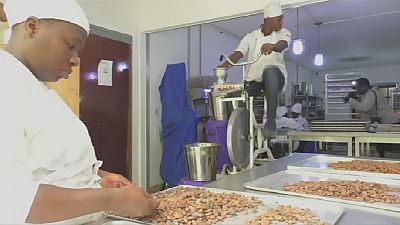The secret or not-so-secret vice of many cyclists is chocolate. Yes, it's one of mine, too.
I reckon that most cyclists prefer dark chocolate. At least, that's been the choice of the cyclists I've known. It's mine, too. It's a great energy food and not sickeningly sweet. Also, milk chocolates are more difficult to digest when riding.
As I've written in previous posts, cyclists have harnessed the power of their wheels to do all sorts of things, such as sharpening knives, making electricity and grinding flour.
So, if cacao beans have to be ground up in order to make chocolate, it makes sense that someone would use the power of pedals turning a wheel to turn out the confections we love.
Such is the idea behind Mon Choco, an operation overseen by Dana Mroueh, who says he is guided by an "eco-friendly" philosophy.
Using stationary bicycles to power the chocolate grinders is just one way Mon Choco minimizes its use of electricity. It also doesn't roast its cacao pods. That, according to Mroueh, also allows the pods to retain more of their original flavor and nutritional value, the latter of which is greater than most people realize. (If you've ever looked for an excuse to eat chocolate, there it is!)
But, in keeping with Mroueh's philosophy, Mon Choco uses organic cacao. That doesn't seem surprising until you realize that Mon Choco is operating in la Cote d'Ivoire, where most of the cacao is grown with the use of pesticides and other chemicals. Those substances are, in themselves, bad enough for the environment. So, however, is the very act of making caocao plantations, which has contributed to deforestation. Environmental campaign groups say that la Cote d'Ivoire is at risk of losing all of its forest cover by 2034.
That deforestation can be said to be part of the "hangover," if you will, of colonialism. La Cote d'Ivoire is the world's largest cacao producer, but until recently, almost no finished chocolate--the real revenue-producer--has been made in the country. Nearly all of the raw cacao or powder has been exported to Europe or, to a lesser extent, North America.
And, while people who've tasted Mon Choco's creations praise them, the sad fact is that most Ivoiriens can't afford them: a typical Mon Choco bar sells for about 1500 CFA (US $2.60) in a country where the average monthly wage, after taxes, is about 200,000 CFA (US $345). So, for the moment, most of Mon Choco's production is exported, mainly to France.
I reckon that most cyclists prefer dark chocolate. At least, that's been the choice of the cyclists I've known. It's mine, too. It's a great energy food and not sickeningly sweet. Also, milk chocolates are more difficult to digest when riding.
As I've written in previous posts, cyclists have harnessed the power of their wheels to do all sorts of things, such as sharpening knives, making electricity and grinding flour.
So, if cacao beans have to be ground up in order to make chocolate, it makes sense that someone would use the power of pedals turning a wheel to turn out the confections we love.
Such is the idea behind Mon Choco, an operation overseen by Dana Mroueh, who says he is guided by an "eco-friendly" philosophy.
 |
Using stationary bicycles to power the chocolate grinders is just one way Mon Choco minimizes its use of electricity. It also doesn't roast its cacao pods. That, according to Mroueh, also allows the pods to retain more of their original flavor and nutritional value, the latter of which is greater than most people realize. (If you've ever looked for an excuse to eat chocolate, there it is!)
But, in keeping with Mroueh's philosophy, Mon Choco uses organic cacao. That doesn't seem surprising until you realize that Mon Choco is operating in la Cote d'Ivoire, where most of the cacao is grown with the use of pesticides and other chemicals. Those substances are, in themselves, bad enough for the environment. So, however, is the very act of making caocao plantations, which has contributed to deforestation. Environmental campaign groups say that la Cote d'Ivoire is at risk of losing all of its forest cover by 2034.
That deforestation can be said to be part of the "hangover," if you will, of colonialism. La Cote d'Ivoire is the world's largest cacao producer, but until recently, almost no finished chocolate--the real revenue-producer--has been made in the country. Nearly all of the raw cacao or powder has been exported to Europe or, to a lesser extent, North America.
And, while people who've tasted Mon Choco's creations praise them, the sad fact is that most Ivoiriens can't afford them: a typical Mon Choco bar sells for about 1500 CFA (US $2.60) in a country where the average monthly wage, after taxes, is about 200,000 CFA (US $345). So, for the moment, most of Mon Choco's production is exported, mainly to France.